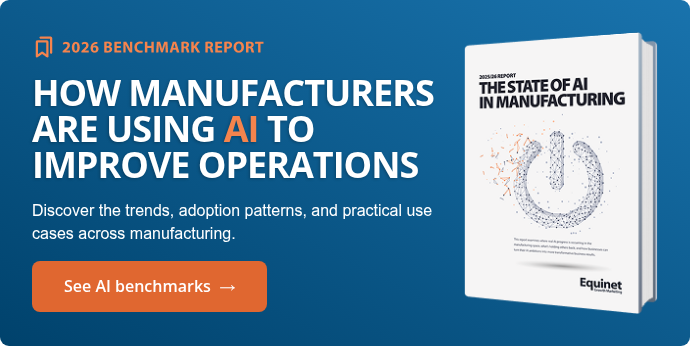A searchquake is happening in the digital landscape. As AI platforms and AI overviews become common tools for online research - are we hurtling towards a future of zero-click search?
For brands that have dedicated years to crafting content designed to attract clicks from organic search, the emergence of 'generative AI search' has been shocking.
It seems a new age of zero-click search is threatening the steady streams of visitors who once came for the information and 'stayed for the brand.’
What is a zero-click search?
When search engines answer all your questions on a single SERP page, eliminating the need to click for more information, that’s a zero-click search.
This trend has been happening for years with Google’s featured snippets and knowledge panels.
But with the advent of AI overviews (AIOs), these instant answers (constructed from various online sources) are becoming even more comprehensive. This is further threatening the delicate balance of the organic search marketing ecosystem.
‘Zero click search’ erodes organic web traffic

It seems fewer people need to click through to the websites they once relied on for information and education.
Just look at the AI overviews in Google and you’ll see why. If you want to research any topic, you don’t have to look far. All the answers you need are right on the front page of Google, restructured by generative AI (such as the now ubiquitous AI overviews in Google).
And with even more comprehensive overviews available in platforms like ChatGPT and Perplexity AI, it seems this might be just the tip of the iceberg.
A taste of an AI-driven future
As GEO expert Arlis Mongold points out:
"As we inch closer to everyone having their own AI assistants that will get to know us far more than we are comfortable with, personalised search will become increasingly prominent. Our algorithmic overlords will play the part of internet butchers, trimming off the fat and serving up the cuts of content just the way we like them."
Source: We are Diagram
We’ve made it too easy for them!
Some brands with highly developed inbound and content marketing strategies have become resentful of the AI revolution.
Over the years, they’ve become so good at answering customer questions that it’s been easy for AI algorithms to scalp that information and repurpose it as their own (often without attribution).
It’s left many wondering about the role of SEO and content marketing going forward.
AI overviews - and the zero-click future
But the idea that content marketers and the brands that invest in them are just stoking the fires for AI monsters to take over is missing the point.
The expert/AI relationship is symbiotic, and Google and the AI platform developers rely on authoritative websites to build their knowledge.
To put it more bluntly:
“It is fundamentally in the interest of every search engine to drive traffic to other sites. As Microsoft CEO Saya Nadella put it: “Our bots are not going to be allowed to crawl search if we are not driving traffic.”
Source: Search Engine Round Table
In the future, we might expect search engines and AI platforms to cite and link to the brands whose content they are using more prominently to acknowledge and reward these sources for their help.
Why and how to rank for Generative AI Search
Generative search is here to stay and will only get more sophisticated - but brands should acknowledge the behaviour change it heralds and embrace it as an opportunity.
Just look at this research from BrightEdge, showing how and when AI overviews are most likely to be served to those conducting Google searches.
They show that AIOs most commonly support detailed ‘information-led’ searches, particularly those in which featured snippets, videos, and infographics are also present in the results.

What’s the lesson here?
You should be optimising websites and content to be accessed and quoted within the AI overview.
As we begin to understand more about how these algorithms work, there is going to be considerable value for brands to become the top citation in the ‘learn more’ frame.
Hopefully, platforms like Moz and SEMRush will soon begin to include these metrics in their reports, so we can benchmark success in optimising for them.
Multi-media becomes more important
BrightEdge's research also underlines that videos and infographics should be used to support written answers (in blogs and pillar pages) wherever possible.
These materials can be heavily branded, so when they are presented as part of the cluster of results with the AI overview, your company can be visible and name-checked in a natural way.
Even if these searches tend to be ‘zero-click’ and do not end up on your website, they ultimately place your brand in central positions in the generative search pack.
SEO is becoming a brand marketing channel!
For some experts, this is the most significant part of the shift to AI search. Rand Fischkin at SparkToro believes the search for clicks will become less important in the world of Generative Engine Optimisation (GEO) while its significance for brand awareness will increase:
“Think of SEO marketing not as a traffic-driving channel but a brand marketing channel
Rand Fischkin
Click-driven search is still happening
But luckily, it’s not all over for click-through!
People still need to find experts and companies that can help them achieve their real-world goals, and they need to use the Internet to find and interact with them.
Content remains the way to articulate and differentiate your brand in the marketplace. In the future, Google, along with all the AI search platforms, is likely to favour and attribute content that is truly original and helpful for their users.
This chart, by Andy Crestadina at Orbit Media, acknowledges this and points out where substantial opportunities still lie for content creators to capture click-throughs from AI-driven search engines.

He points out that customers and prospects are still looking to access brands' deep sector knowledge, as evidenced by the long-tail keywords and highly intentional searches we’re still seeing in Google Analytics, Moz, and SEMRush.
And when they do, we must reward them with the right content for these searches.
As these searches are increasingly shading into commercial intent - this content can afford to be more branded and conversion-driven than perhaps was the case in the past.
How to prepare your content strategy for gen AI search
1. Prioritise EEAT
In the age of GEO, Google values Experience, Expertise, Authority, and Trust (EEAT) more than ever. By emphasising deep expertise, real-world experience, and proven authority in your content, you can build trust with both your audience and generative search engines. Rich, well-researched, and insightful content will be ranked highly and cited by AIOs and AI platforms like ChatGPT and Perplexity AI.
Keep writing content and optimising your old content for long-tail keywords and semantic SEO. Ensure you're answering your prospects' burning questions in the language and formats that resonate with them.
2. Be better than AI
If there’s one thing AI is ravenous for, it’s fresh content - stats, insights, interviews - anything it can consume and learn from. But since ChatGPT, brands have been able to use AI platforms to create content, which has resulted in an unholy cycle of cannibalisation. If this continues, there won’t be any original content left for the AI platforms to learn from!
If you want to be cited as an expert source in generative search results, ensure your content is original and authoritative. Don’t rely on recycled definitions and AI-generated copy to fill your website—build your own voice and use your own experts to lead the way.

3. Create multi-media content
Generative search engines pull from a variety of content types. Enhancing your site with multimedia content ensures you remain relevant and available in the SERPs:
- Videos, images, and infographics: Visual content simplifies complex information, making it engaging and easier to digest. Consider demonstrating manufacturing processes or sharing product breakdowns visually.
- Interactive elements: Add tools like ROI calculators, quizzes, or even interactive 3D models of your manufacturing solutions.
- Bolster your socials: Orchestrate your messages and delivery across platforms.
- Podcasts and webinars: Develop deep content discussing industry trends and technological advancements. This helps diversify your content offering and attract audiences seeking various content formats.
If you are not producing video to augment your written content, you will almost certainly miss the opportunity to rank in modern search.
4. Carve out your niche
Generative AI is looking for multiple perspectives, authentic experiences and authoritative voices to share with those looking for answers. To ensure you are included in the search returns that drive traffic and brand recognition in SERPS and AI platforms, you should:
Develop a unique brand voice and perspective: Make sure your content is purposeful, stands out and attracts a loyal audience seeking reliable expertise.
Make sure a range of writers contribute to your blogs and white papers. Internal experts and guest bloggers should all contribute to your content, which should be rich with quotes and observations from the thought leaders and disruptors of the day.
Share original research and case studies: Produce exclusive insights, research reports, and case studies demonstrating your company’s knowledge and problem-solving capabilities.
5. Focus on conversion
With less but more intentional traffic arriving on sites, your focus should be on conversion.
Compelling Calls-to-Action (CTAs): Craft CTAs that resonate with each buyer segment, whether offering a demo, a free consultation, or links to a research paper. Capture email addresses, and make sure they're following you on LinkedIn. Ensure you can continue the conversation with them after they have engaged with you.
Personalised content for user segments: Tailor content to specific personas, such as targeting CEOs who seek strategic partnerships or engineers interested in technical details. Make sure you are pushing the right content offers to progress their specific journeys.
Conclusion
It's still early days for generative search. We still don't know the trend's long-term impact on web traffic or how search engines and AI platforms will develop their relationships with content creators in the future.
But it does seem that 'brand' will become an increasingly important currency in the world of search. The quality and consistency of your content will be central factors in your inclusion in AI overviews.
Meanwhile, the recognisability of your messaging, logos, videos and infographics will become even more important as AI increasingly curates and mediates them.


